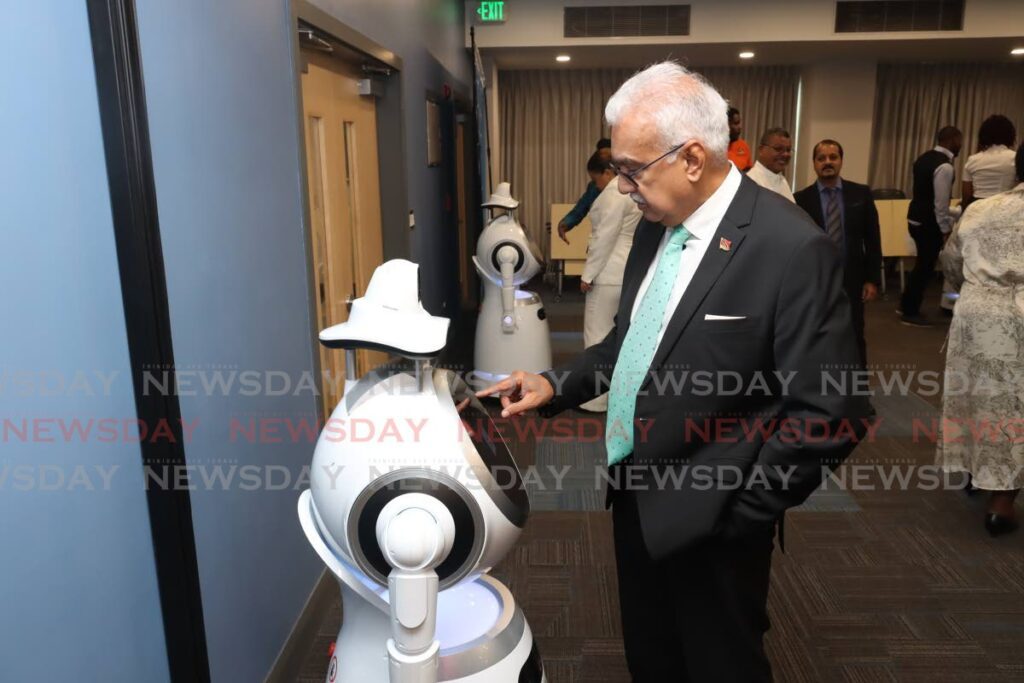Health minister wants AI help to diagnose, treat cancer

HEALTH Minister Terrence Deyalsingh wants to integrate artificial intelligence (AI) in the general diagnosing and treating of cancer.
He made this known while speaking at the MRI launch and handover of a donation of oncology diagnostic and imaging machines by Phoenix Park Gas Processors Ltd (PPGPL) at the Cancer Centre, St James Medical Complex on September 7.
PPGPL, which is part of the NGC Group of Companies, donated 14 pieces of oncology equipment worth US$10-12 million including an MRI unit, an x-ray machine, mobile fluoroscopic systems and CT scanners.
It also also contributed to three years of maintenance support for the equipment, and training of technicians, via the equipment provider.
Deyalsingh said using AI is the direction the world is going and Trinidad and Tobago (TT) has to join this movement. He said AI could read scans quickly and accurately, picking up abnormalities the human eye would not and allow for faster cancer diagnoses.
“Phase two. Let’s put on the afterburners and get this done. And hopefully, in the shortest possible space of time, TT can be a regional leader in the implementation of AI when it comes to the diagnosis and treatment of cancer.”
Deyalsingh said so in response to the offer by PPGPL president Dominic Rampersad of a further partnership with the ministry to evaluate the equipment to, one day soon, integrate it with AI.
Rampersad said the natural gas resources of the country belonged to the people so they must be the first to benefit. The idea behind making the donation was to ensure the people of TT got “first-world” medical support when they were ill.
He said the state entity was working on arrangements for the donation for the past 13 years even as the private health care sector was against this initiative and had asked the company not to do so. But they were ignored, Rampersad said, because affordability should not be a barrier to quality health care.
“This is not just a donation and a responsibility, but an obligation of corporate TT to be part of the health care of this country. Our responsibility cannot just stop when we pay our dividends and our taxes.”
Dr Kellie Alleyne-Mike, medical director of the Cancer Centre, said the equipment would help to diagnose more patients, more quickly, which meant higher rates of survival, in addition to saving the country money.
She said that in the past five months, the MRI unit at the centre had scanned over 500 people. She said it was not just a technological upgrade but represents a “giant leap” in the mission to give “exceptional” health care to all.
“This is a milestone event that symbolises progress, collaboration and a shared vision of a healthier future. It’s a shining example of what can be achieved when the public and private sectors come together for a greater good.”
Acting Prime Minister Stuart Young said that over the last nine years, government spent TT’s limited resources responsibly, prioritising health, education and national security. Young, the energy minister, is deputising for Dr Rowley who is overseas on medical grounds.
He added that the energy sector played an important role in the country’s economy and always tried to extract more for its people.
“The resources of the people must go back to the people of TT and what better way than to the health care system and, in particular, an extensive oncology system in TT. And for that I applaud the NGC Group here this morning,” Young said.
He said government paid “tens of millions of dollars” in the private health care system so citizens could access oncology services. So the donation of equipment was a conscious decision by the government to try and build capacity in the public health system.
Young also encouraged the private sector to engage in more corporate social responsibility.
“Those who have more in our corporate society, try and help those who have less. Because the government cannot carry it alone.
When I see things like this in the CSR, even though it’s a state enterprise, hopefully it will open up that confidence and opportunity and desire in other private sector companies to find these types of partnerships, in particular with the health sector, in particular with our education sector, to look after all of the citizens of TT.”
Deyalsingh added that, before the facility had the MRI unit, the 500 on whom the equipment was used would have had to go to other facilities, mainly in the private sector. So it would save the taxpayers a lot of money.
He thanked PPGPL for being the conduit for the taxpayers to invest and be rewarded for their investments.
He also offered condolences to the families of NWRHA daily-paid employee Jamaal Watts, who was murdered while working on the St James Medical Complex compound on September 4, and of musician and calypso saxophonist Roy Cape who was diagnosed with cancer in 2014 and died of a stroke on September 5.
He said their deaths made people recognise loss, but that, with the donation, which was spread throughout the various RHAs in Trinidad, there was also a future.

Comments
"Health minister wants AI help to diagnose, treat cancer"